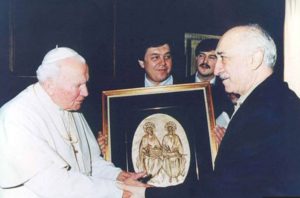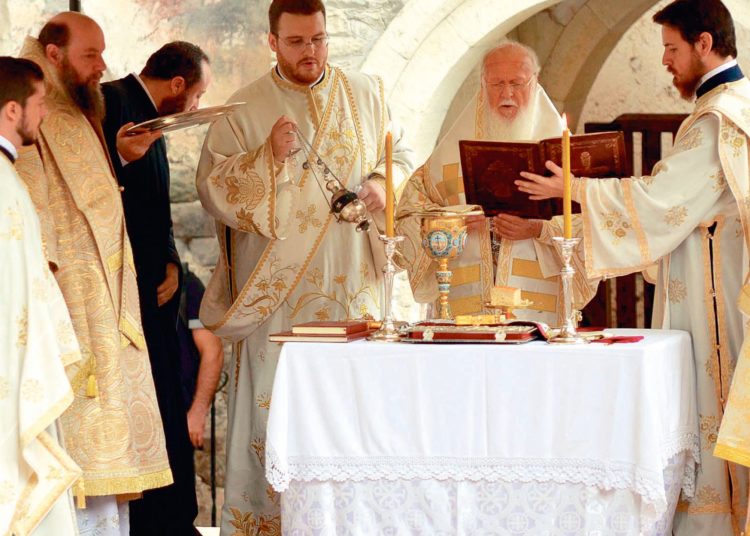Abdullah Bozkurt/Stockholm
In a indictment recently filed against a group that is critical of the government in Turkey, public prosecutors cited interfaith dialogue with Jews and Christians as criminal evidence in leveling accusations.
Prosecutors alleged in the indictment submitted to a high criminal court in Istanbul on March 2, 2022 that the Gülen movement, a group opposed to the government of President Recep Tayyip Erdoğan, had established dialogue with Jewish and Christian organizations rather than Muslim and Turkish ones around the globe.
The allegations were incorporated into the indictment by Istanbul deputy chief prosecutors Bülent Başar and Zafer Koç as part of a government campaign to crack down on people believed to be affiliated with the Gülen group.
The accusations reflect how the ruling Islamist elite’s political Islamist ideology, which defines non-Muslims as enemies, has dominance in driving criminal prosecutions in Turkey, a country that has had a poor human rights record in the last decade.
Prsident Erdoğan had slammed interfaith dialogue efforts in the past, saying there cannot be dialogue between Islam and Christianity, in a xenophobic speech he delivered to lawmakers in the Pakistani Parliament in November 2016 during an official visit to the country.
Part of the indictment, dated March 2, 2022, listed interfaith dialogue with Jews and Christians as criminal evidence against the Gülen group:
This is not the first-time prosecutors have listed interfaith dialogue activities as evidence of a crime, despite the fact that there is no legal provision in the Turkish Penal Code describing such work as criminal. In 2015 an indictment filed against Fethullah Gülen, the Turkish Muslim scholar, resident in the US, who inspired the movement, listed Gülen’s 1998 meeting with the pope at the Vatican as criminal evidence.
The new indictment targets 68 Turkish police chiefs who had in the past investigated a violent neo-nationalist group that threatened non-Muslim minorities in Turkey, plotted assassinations and illegally profiled Christian groups in a clandestine surveillance campaign.
The investigation, launched in June 2007 after the police discovered a cache of weapons and explosives in Istanbul, identified 275 suspects, some of whom worked with the Turkish military, as driving the campaign against non-Muslim minorities.
During the course of the investigation, the police also exposed the Independent Turkish Orthodox Patriarchate (Bağımsız Türk Ortodoks Patrikhanesi), a Turkish intelligence-linked, fake patriarchate run by the same neo-nationalist group in Turkey. The group had viciously pursued a hateful campaign targeting the Ecumenical Patriarchate of Constantinople.
The suspects were tried and convicted but later released in 2014 when they struck a secret deal with Erdoğan, who orchestrated their release despite overwhelming evidence in the case file. The tables were turned against the police chiefs and prosecutors who had exposed the group. The Erdoğan government purged all those involved in the investigations and prosecutions, jailing many on trumped-up charges.
The indictment was filed with the court by deputy chief prosecutors Bülent Başar and Zafer Koç:
Saved by the government, the group resumed their hostile activities against non-Muslim in Turkey. Sevgi Erenerol, a convicted felon and one of the leaders of the Independent Turkish Orthodox Patriarchate, filed a criminal complaint in 2019 against Ecumenical Patriarch Bartholomew I, the spiritual leader of Eastern Orthodox Christians worldwide, and 12 members of the Synod. In her complaint Erenerol accused the ecumenical patriarch of being separatist and divisive, describing him as a tool of the United States.
The neo-nationalist group’s campaign against Bartholomew I came right after the church made a decision in January 2019 to recognize the Ukrainian Church, severing a four-century link to the Russian Orthodox Church.
Erenerol and her radical group played a lead role in a demonizing campaign launched against Turkish-Armenian journalist Hrant Dink, who was accused of insulting the Turkish state before he was killed by a nationalist figure in January 2007. Erenerol led a protest against the journalist in front of the courthouse where Dink was being tried and even orchestrated an assault by her group, victimizing Dink even further.
The police investigation revealed that Erenerol worked closely with Veli Küçük, a retired Turkish brigadier general who founded JİTEM, a notorious intelligence arm of the Turkish Gendarmerie. They had been meeting at this bogus orthodox church for years to discuss plots. Küçük was also convicted in 2013 and sentenced to life in prison but was released in 2014 with the help of Erdoğan.

Some of the police chiefs who were indicted earlier this month were involved in investigating threats against Jewish groups in Turkey. In 2010 police chief Yurt Atayün and his team investigated operatives of a pro-Iranian Turkish group linked to Iran’s Quds Force after the group issued a blanket threat targeting Jews in Turkey and around the world.
“Jews in Turkey including their rabbis and leaders have always supported the Zionist regime [Israel] and they no longer deserve to feel safe in Turkey,” said Nureddin Şirin, a convicted felon who served time on terrorism charges and his links to the Quds Force. Şirin delivered remarks to a group called the Gaza Volunteers Platform, which had gathered to protest the imprisonment of İzzet Şahin, the West Bank representative of the jihadist Foundation for Human Rights and Freedoms and Humanitarian Relief (İnsan Hak ve Hürriyetleri ve İnsani Yardım Vakfı, or IHH) on May 8, 2010.
Atayün ordered police units to investigate Şirin and his associates over threats to Jews in Turkey, but that order was later cited as evidence for imprisoning Atayun and his colleagues who were involved in the investigation of Quds Force cells. Atayün has been in jail since 2014 on fabricated charges brought forward by the government. Nordic Monitor published a story last year revealing how another police chief was jailed by the Erdoğan government because he took measures to protect Jews based on Mossad intelligence that was passed to Turkey through official channels.

Under Erdoğan’s 20-year rule, Turkey has become hostile territory for many non-Muslim groups, with a rapid rise of xenophobia, anti-Semitism and anti-Christian sentiment among the population. The hate campaign against non-Muslim minorities is often reflected in the official remarks and commentaries delivered by government officials and amplified for a larger audience by state-controlled media outlets.
The textbooks rewritten to teach pupils at public schools also reflect the radical transformation Turkey has undergone in recent years. Some of the articles found in school textbooks were analyzed and published by Nordic Monitor in the past. In one instance, it found that the 12th grade modern history book is full of anti-American and anti-EU references, mirroring what the Turkish president has been preaching at public rallies and meetings. The 2018 edition, authored by Emrullah Alemdar and Savaş Keles and published by the government printing office, justified al-Qaeda’s terrorist attacks on the US on September 11, 2001 that killed nearly 3,000 people, branded the European Union as a Christian club led by the pope and criticized the NATO alliance.












